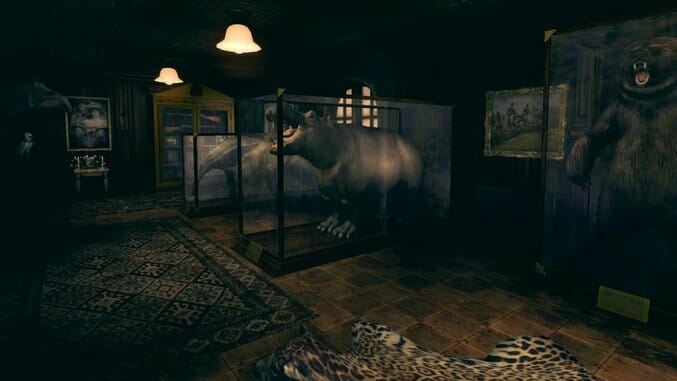
I check my email for the third time in a span of 5 minutes. I try picking back up the novel I’ve been bored with. I open the pantry and peruse its contents. I turn on the television. I am avoiding playing a videogame that I bought with my own money for my own enjoyment.
Amnesia: The Dark Descent is one of the most memorable games I have ever played, so I didn’t hesitate to purchase the sequel, Amnesia: A Machine for Pigs, the day it came out. Yet my wife and daughter are out of town and here I am sitting on the couch watching Super Nanny while the game finished downloading three hours ago. The Dark Descent is the only videogame I ever played that made me lose sleep and may have even spawned nightmares. It employed a sanity mechanic where the more players were in the dark, the more difficult it became to parse reality. The very thought of playing its sequel is unsettling.
When I finally push through and start the game, I awake to find myself in a bed surrounded by steel bars. It’s London, 1899, and I’m playing as a wealthy industrialist named Oswald Mandus. I hear the voices of my sons calling me, and walk down a hallway and into a dark room. Unable to find a way forward, I double back, and find an ornate ceramic pig on the ground. Was it there before? Not long afterward, I see the outline of a dark figure in the bed I awoke in. Later on, when I double back, the bed is empty and there are blood stains on the floor. Did these details escape my notice? Am I seeing things? I hear whimpering in the foyer below. As I traverse the stairs, I hear a loud crash and a portrait falls from the wall. I walk to the portrait which is now on the floor. It is a picture of woman holding a baby in one hand and scissors in the other. Instances like these are deeply unsettling and represent the best of what Amnesia: A Machine for Pigs has to offer.
Much like The Dark Descent, these moments put us in a nightmare that feels real. They pique our curiosity, cause us to question our reality and challenge us to summon the bravery necessary to continue. Moving even a few feet feels like a tremendous accomplishment.
Despite being almost as unsettling as its predecessor, A Machine for Pigs is quite different. Frictional Games, the developers of the first Amnesia, handed development of the sequel over to The Chinese Room, the developers of Dear Esther. Much like Dear Esther, the game is a story-driven first person experience. There are puzzles, but they mostly require basic activating of switches and pressing buttons to repair various portions of the titular machine. There is no inventory and no sanity mechanic. Like The Dark Descent, players are equipped with a lantern but this time players are not given a limited supply of oil to power the lantern—they must merely manage its use so as not to alert the game’s monsters. Like Dear Esther, reaching new areas triggers memories that tell us more about the machine. Players also uncover journal entries and recordings that shed light on the machine, Mandus’ past, and his sons’ future.
Much like Dear Esther before it, A Machine for Pigs features quality voice-acting and a story that gradually encompasses major real-world issues. The morality of war, the efficacy of religion, and the social impact of industrialism are all explored. Sadly, however, toward the end of the game these questions begin to overshadow the game’s immersive horror. Early on, I cringed in anticipation of the effect every time I pulled a lever or opened a door. In the last hour of the game, which is mostly devoted to exposition, I no longer feared the game’s environments and instead rushed toward what felt like a rather obvious conclusion.
By abandoning its most terrifying elements in the game’s final moments, A Machine for Pigs fails to provide horror on par with its predecessor. This isn’t all bad, as thankfully I have not lost sleep or had any nightmares since playing the game. Instead what I found was a more ambitious story that asks important questions of our past while showing the impact it has on our present.
Amnesia: A Machine for Pigs was developed by The Chinese Room and published by Frictional Games. It is available for Mac, PC and Linux.
Drew Dixon is the editor-in-chief of Game Church. He also edits for Christ and Pop Culture and writes about videogames for Think Christian. Follow him on Twitter.
